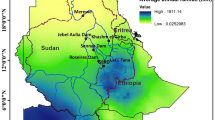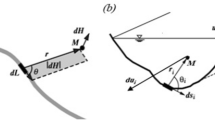Abstract
Forecasted inflow is one of the most important input information for reservoir operation planning. However, current inflow prediction accuracy is difficult to meet the needs of long-term operation. Therefore, it is of great significance to consider the uncertainty of inflow forecast and study its influence on reservoir operation decisions. In this paper, a long-term scheduling framework considering inflow forecast uncertainty based on a temporal disaggregation method is proposed. First, the uncertainty of forecast is described from two aspects. Gaussian distribution is used to simulate the annual forecast error, and an Adaptive Nearest Neighbor Gaussian sampling method (A-NGS) is proposed to decompose annual inflow into temporal series. Based on the implicit scheduling model, the sample set of generation scheduling plans, actual dispatching schemes and theoretical optimal results are constructed. On this basis, a series of indexes are presented to evaluate the inflow simulation performance and the scheduling benefits. A case study of the Xiluodu-Xiangjiaba cascade reservoirs is conducted to analyze the effects of forecast uncertainty on operation benefits, and the effectiveness of forecast information is identified. Compared with the deterministic fragment method, the inflow processes simulated by A-NGS achieve better precision and behave more conducive to the scheduling. Although the uncertainty of forecast errors will bring some hydropower generation losses, a certain degree of forecast accuracy is effective to improve scheduling benefits when in the electricity market.





Similar content being viewed by others
Data Availability
Not applicable.
References
Arsenault R, Côté P (2018) Analysis of the effects of biases in ESP forecasts on electricity production in hydropower reservoir management. Hydrol Earth Syst Sci Discuss 23:2735–2750
Carpentier P-L, Gendreau M, Bastin F (2013) Long-term management of a hydroelectric multireservoir system under uncertainty using the progressive hedging algorithm. Water Resour Res 49:2812–2827
Celeste AB, Billib M (2012) Improving implicit stochastic reservoir optimization models with long-term mean inflow forecast. Water Resour Manag 26:2443–2451. https://doi.org/10.1007/s11269-012-0025-1
Chandramouli V, Deka P (2005) Neural network based decision support model for optimal reservoir operation. Water Resour Manag 19:447–464
Cuvelier T, Archambeau P, Dewals B et al (2018) Comparison between robust and stochastic optimisation for long-term reservoir management under uncertainty. Water Resour Manag 26:2267–2281. https://doi.org/10.1007/s11269-017-1893-1
de Santana Moreira RM, Celeste AB (2017) Performance evaluation of implicit stochastic reservoir operation optimization supported by long-term mean inflow forecast. Stoch Env Res Risk A 31:2357–2364. https://doi.org/10.1007/s00477-016-1341-4
Ding X, Zhou J, Mo X, Wang C, Wang Y, & Lei X, et al. (2018) Runoff forecasting benefit evaluation for long-term power generation scheduling. Matec Web of Conferences, 246
Fan FM, Schwanenberg D, Alvarado R et al (2016) Performance of deterministic and probabilistic hydrological forecasts for the short-term optimization of a tropical hydropower reservoir. Water Resour Manag 30:3609–3625. https://doi.org/10.1007/s11269-016-1377-8
Feng Z, Niu W, Zhang R, Wang S, Cheng C (2019) Operation rule derivation of hydropower reservoir by k-means clustering method and extreme learning machine based on particle swarm optimization. J Hydrol 576:229–238. https://doi.org/10.1016/j.jhydrol.2019.06.045
Harboe R (1993) Explicit stochastic optimization springer. Netherlands pp:295–306
Hoshi K, Burges SJ (1980) Seasonal runoff volumes conditioned on forecasted total runoff volume. Water Resour Res 16:1079–1084
Kim YO, Palmer RN (1997) Value of seasonal flow forecasts in Bayesian stochastic programming. J Water Resour Plan Manag 123:327–335
Lall U, Sharma A (1996) A nearest neighbor bootstrap for resampling hydrologic time series. Water Resour Res 32:679–693
Lei X, Tan Q, Wang X, Wang H, Wen X, Wang C, Zhang J (2018) Stochastic optimal operation of reservoirs based on copula functions. J Hydrol 557:265–275. https://doi.org/10.1016/j.jhydrol.2017.12.038
Li C, Zhou J, Ouyang S, Ding X, Chen L (2014) Improved decomposition–coordination and discrete differential dynamic programming for optimization of large-scale hydropower system. Energy Conversion & Management 84:363–373
Liu Y, Zhang Z, Yao L, Wang Y, Li J, Liu G, Zhou J (2019) Deriving reservoir operation rule based on Bayesian deep learning method considering multiple uncertainties. J Hydrol 579:124207
Motevalli M, Zadbar A, Elyasi E, Jalaal M (2015) Using Monte-Carlo approach for analysis of quantitative and qualitative operation of reservoirs system with regard to the inflow uncertainty. J Afr Earth Sci 105:1–16
Motovilov YG, Gottschalk L, Kr E, Rodhe A (1999) Validation of a distributed hydrological model against spatial observations. Agricultural & Forest Meteorology 98-99:257–277
Mujumdar PP, Nirmala B (2006) A Bayesian stochastic optimization model for a multi-reservoir hydropower system. Water Resour Manag 21:1465–1485. https://doi.org/10.1007/s11269-006-9094-3
Nowak K, Prairie J, Rajagopalan B, Lall U (2010) A nonparametric stochastic approach for multisite disaggregation of annual to daily streamflow. Water Resour Res 46(8). https://doi.org/10.1029/2009wr008530
Safa HH, Morid S, Moghaddasi M (2012) Incorporating economy and long-term inflow forecasting uncertainty into decision-making for agricultural water allocation during droughts. Water Resour Management 26:2267–2281. https://doi.org/10.1007/s11269-012-0015-3
Sangiorgio M, Guariso G (2018) NN-based implicit stochastic optimization of multi-reservoir systems management. Water 10:303
Silva AT, Portela MM (2012) Disaggregation modelling of monthly streamflows using a new approach of the method of fragments. Hydrol Sci J 57:942–955. https://doi.org/10.1080/02626667.2012.686695
Singh SK (2016) Long-term Streamflow forecasting based on ensemble Streamflow prediction technique: a case study in New Zealand. Water Resour Manag 30:2295–2309
Tan Q, Fang G, Wen X, Lei X, Wang X, Wang C, Ji Y (2020) Bayesian stochastic dynamic programming for hydropower generation operation based on copula functions. Water Resour Manag 34:1589–1607
Tejada-Guibert JA, Johnson SA, Stedinger JR (1995) The value of hydrologic information in stochastic dynamic programming models of a multireservoir system. Water Resour Res 31:2571–2579
Wang J (2010) A new stochastic control approach to multireservoir operation problems with uncertain forecasts. Water Resour Res 46
Wang W, Jing D (2007) A multivariate non-parametric model for synthetic generation of daily streamflow. Hydrol Process 21:1764–1771
Wang Y, Guo S, Chen H, Zhou Y (2014) Comparative study of monthly inflow prediction methods for the three gorges reservoir. Environmental Research & Risk Assessment 28:555–570
Willis R, Finney BA, Chu WS (1984) Monte Carlo optimization for reservoir operation. Water Resour Res 20:1177–1182
Xie M, Zhou J, Li C, Zhu S (2015) Long-term generation scheduling of Xiluodu and Xiangjiaba cascade hydro plants considering monthly streamflow forecasting error. Energy Conversion and Management 105:368–376. https://doi.org/10.1016/j.enconman.2015.08.009
Xu W, Zhang X, Peng A, Liang Y (2020) Deep reinforcement learning for cascaded hydropower reservoirs considering inflow forecasts. Water Resour Manag 34:3003–3018. https://doi.org/10.1007/s11269-020-02600-w
Young GK (1967) Finding reservoir operating rules. J Hydraul Div 93:293–321
Yuan Z, Yan D, Yang Z, Yin J, Zhang C, Yuan Y (2016) Projection of surface water resources in the context of climate change in typical regions of China. Hydrol Sci J 62(2):283–293. https://doi.org/10.1080/02626667.2016.1222531
Zambelli MS, Luna I, Soares S (2009) Long-term hydropower scheduling based on deterministic nonlinear optimization and annual inflow forecasting models. In: PowerTech, 2009 IEEE Bucharest
Zhang X, Peng Y, Xu W, Wang B (2019) An optimal operation model for hydropower stations considering inflow forecasts with different Lead-times. Water Resour Manag 33:173–188. https://doi.org/10.1007/s11269-018-2095-1
Zhao T, Zhao J (2014) Joint and respective effects of long- and short-term forecast uncertainties on reservoir operations. J Hydrol 517:83–94. https://doi.org/10.1016/j.jhydrol.2014.04.063
Zhao T, Cai X, Yang D (2011) Effect of streamflow forecast uncertainty on real-time reservoir operation. Adv Water Resour 34:495–504. https://doi.org/10.1016/j.advwatres.2011.01.004
Zhu S, Luo X, Xu Z, Ye L (2019) Seasonal streamflow forecasts using mixture-kernel GPR and advanced methods of input variable selection. Hydrol Res 50:200–214. https://doi.org/10.2166/nh.2018.023
Acknowledgements
Special thanks are given to the anonymous reviewers and editors for their constructive comments.
Funding
This work is supported by the Fundamental Scientific Research Business Expenses for Central Public Welfare Research Institutes (No.CKSF2019433/SZ), the National Natural Science Foundation of China (No.51709012, U1865202, 51809097), and the National Public Research Institutes for Basic R&D Operating Expenses Special Project (No. CKSF2019209).
Author information
Authors and Affiliations
Contributions
Xiaoling Ding and Jianzhong Zhou conceived of the study, supervised the experiments and Xiaoling Ding wrote the manuscript. Xiaocong Mo provided some instructions on experiments. Sheng Bib, Benjun Jia a and Xiang Liao helped to process some data and produce some figures.
Corresponding author
Ethics declarations
Conflict of Interest
The authors declare no conflicts of interest.
Ethics Approval
Not applicable.
Consent to Participate
Not applicable.
Consent to Publish
All the authors agree to the publication of this paper.
Code Availability
Not applicable.
Additional information
Publisher’s Note
Springer Nature remains neutral with regard to jurisdictional claims in published maps and institutional affiliations.
Rights and permissions
About this article
Cite this article
Ding, X., Mo, X., Zhou, J. et al. Long-Term Scheduling of Cascade Reservoirs Considering Inflow Forecasting Uncertainty Based on a Disaggregation Model. Water Resour Manage 35, 645–660 (2021). https://doi.org/10.1007/s11269-020-02748-5
Received:
Accepted:
Published:
Issue Date:
DOI: https://doi.org/10.1007/s11269-020-02748-5




